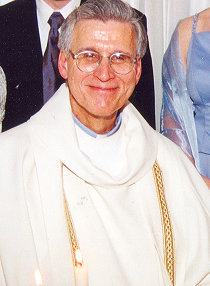
Notes from an interview I had with George in 2003, a year prior to his death.
George’s approach was about following the wisdom
imprinted inside the human person. There is a “life force” in us that is always trying to break us open, that pushes us along. This process never ends and makes us tremendously resilient. You may get stuck, but there is always a way to go through. Something
gets people up and keeps them going, no matter what has happened to them.
This process takes us step by step. In the middle
of not knowing where to go in crisis, a door opens to the next step, giving meaning to life. If you’re not in crisis, by definition,
you don’t move. The growth period will come, naturally. Crisis, personality, and identity come automatically.
George
agreed with Fritz Perls that this inner mechanism meant that the person knows what to do and knows where to go inside. This
healing process is inside already. We are supposed to guide that process, but what we often do is obliterate it or medicate
it. Many do not want to do the work.
That leads to another important point: We are free to make our own choices. That’s
important in this whole healing process. When you don’t choose, then you give up your freedom to someone else, and results are
poor.
Another component is meditation, stillness. St. Basil urged us to stop getting ourselves distracted and get quiet. Automatically and spontaneously, your whole being turns towards God (or however you want to describe the experience of something or
someone larger than ourselves). We’re made this way. It comes out of the unconscious.
Role of counsellor:
You
can’t go to the depths with others, unless you’ve experienced it yourself first.
Many who come are embarrassed to say anything
about their inner [religious] experiences. They thought they were going crazy. A part of his role was to reassure them
that this is part of the process. He said “I’m a compassionate presence; willing to suffer with them. I don’t know where they’re going
either. I spend much time reassuring people that they will get there.” He said that without relationship, it wouldn’t
happen.
A critical component is not only to teach the existence of the process, but also to help people learn how to follow it,
to understand its language. He was about helping them become co-responsible. Of utmost importance is the need to engage in quietness.
Requirements
of good counsellor:
· Do your personal work
· You
have to have experienced this healing process yourself; it has to be part of you; otherwise you can’t guide: don’t know where to go
and you get scared.
· Stillness / prayer: teaches to listen in silence.
· Avoid pitfall of trying to fix/change other. Know what you’re responsible for – be compassionate listener; not to get better/cure.
· If you are going into this, you have work to do; not just client who is in process. As guide you have to be out ahead; always
working on yourself, your own process. Otherwise, you become less helpful
Goals:
Essential goal: to help people come
awake and be governed under the “True Self: truest identity in depths of person. It begins to inform everything you do. You then begin to see everyone differently because you see yourself. If you don’t have that, you relate superficially, with
persona. Never fully alive.
Personal identity: spiritual name is there to be discovered. Wants to form others to
help them discover who they are.
Dramatic radical shift to living from within; from one’s own inner cues, and not caught up in
what others do.
Growth goes in steps; foundations are laid and then go to next step; cyclic – open, close & consolidate,
open. You may feel like you’ve gone back to square one, but you’re not.
Weakness of approach:
Not everyone willing
to go this way
How to form others to counsel using this approach? It’s not for everyone. Try to call forth people
who really want to go. Needs motivated people (typically those in crisis).
Spirituality = universal wisdom, how it is experienced. We become aware that we are all part of the human family, that there is a whole new self, that it reworks everything, no matter what happens. Don’t have to say “God.”
The Butterfly
by Kazantzakis from Zorba the Greek
I remember one morning when I discovered a cocoon in the back of a tree just
as a butterfly was making a hole in its case and preparing to come out. I waited awhile, but it was too long appearing and I was impatient.
I bent over it and breathed on it to warm it. I warmed it as quickly as I could and the miracle began to happen before my eyes, faster
than life. The case opened; the butterfly started slowly crawling out, and I shall never forget my horror when I saw how its wings
were folded back and crumpled; the wretched butterfly tried with its whole trembling body to unfold them. Bending over it, I tried
to help it with my breath, in vain.
It needed to be hatched out patiently and the unfolding of the wings should be a gradual process
in the sun. Now it was too late. My breath had forced the butterfly to appear all crumpled, before its time. It struggled desperately
and, a few seconds later, died in the palm of my hand.
That little body is, I do believe, the greatest weight I have on my conscience.
For I realize today that it is a mortal sin to violate the great laws of nature. We should not hurry, we should not be impatient,
but we should confidently obey the eternal rhythm.